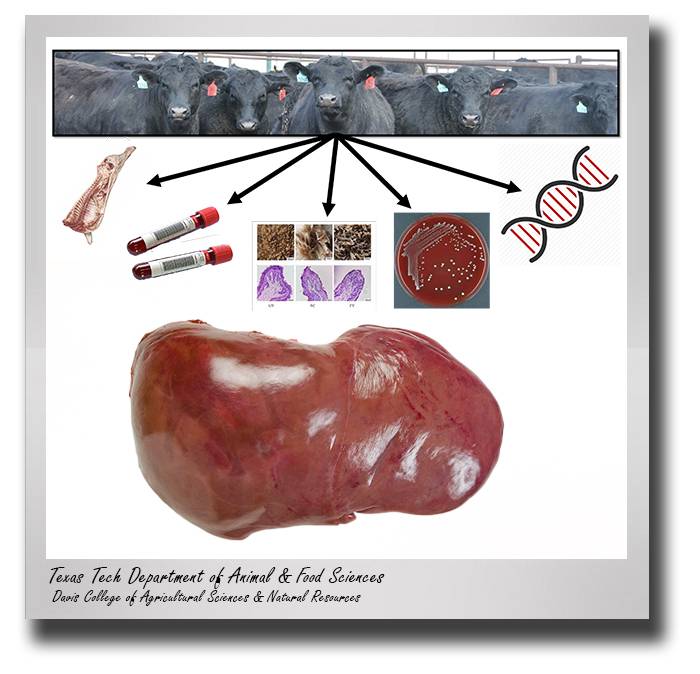AFS’s Dale Woerner addresses costly liver abscess formation in cattle
By: Norman Martin
 Dale Woerner, the Cargill Endowed Professor within Texas Tech’s e Department of Animal & Food
Sciences, is set to lead a $633,000 research study to create a model for genomic,
blood and microbiological markers for liver abscesses in beef cattle. The research
is aimed at identifying factors that contribute to the liver abscess condition in
cattle in an attempt to find early identifiers and interventions.
Dale Woerner, the Cargill Endowed Professor within Texas Tech’s e Department of Animal & Food
Sciences, is set to lead a $633,000 research study to create a model for genomic,
blood and microbiological markers for liver abscesses in beef cattle. The research
is aimed at identifying factors that contribute to the liver abscess condition in
cattle in an attempt to find early identifiers and interventions.
 Liver abscesses are a significant problem in beef and dairy cattle, Foundation for Food & Agriculture Research (FFAR) website announcement. The condition occurs when bacteria cross from an animal’s
gastrointestinal tract into the bloodstream and accumulate in the liver. Liver abscesses
jeopardize animals’ health and cost producers approximately $30 million annually.
Liver abscesses are a significant problem in beef and dairy cattle, Foundation for Food & Agriculture Research (FFAR) website announcement. The condition occurs when bacteria cross from an animal’s
gastrointestinal tract into the bloodstream and accumulate in the liver. Liver abscesses
jeopardize animals’ health and cost producers approximately $30 million annually.
“The liver abscess condition presents a variety of challenges to the beef industry in the growing and processing phases,” Woerner said. “Cattle with liver abscesses are lower performing and less efficient, and they produce carcasses and by-products with lesser value.”
Woerner will be investigating genetic markers and biomarkers, including blood chemistry and individual microbial pathogen prevalence, which contribute to the formation of liver abscesses. Identifying markers in cattle predisposed to developing liver abscesses would allow producers to make more informed breeding and management decisions to reduce susceptibility in cattle and reduce reliance on antimicrobial treatments.
The research study, titled “Modeling for genomic, blood, and microbiological markers for liver abscesses in fed beef cattle,” is supported by $300,000 grant from International Consortium for Antimicrobial Stewardship in Agriculture (ICASA), along matching funds provided by Texas Tech University and ICASA partners Genus ABS, Hy-Plains Feedyard, LLC and VRCS for a $633,462 investment.
“Cattle are the largest agricultural income producer in the region,” said Darren Hudson, Davis College Associate Dean for Strategic Initiatives & Assessment and the Larry Combest Endowed Chair for Agricultural Competitiveness. “Dr. Woerner’s work to reduce the physiological and economic impacts of liver abscesses will have significant impacts on the industry and the West Texas region.”
 In the project’s abstract, Woerner noted that it has been established and widely accepted
that liver abscesses in cattle result from Fusobacterium necrophorum infections, yet
some four decades of research hasn’t provided a conclusive solution, indicating the
problem is multifactorial.
In the project’s abstract, Woerner noted that it has been established and widely accepted
that liver abscesses in cattle result from Fusobacterium necrophorum infections, yet
some four decades of research hasn’t provided a conclusive solution, indicating the
problem is multifactorial.
Woerner’s study is designed as an investigation for genetic and biomarkers associated with the condition of liver abscesses, as well as ‘modeling’ the liver abscess condition in the animal/carcass. If successful, the study could result in an accurate modeled “description” of the abscessed beef animal and in the development of a gEPD for liver score, which will be the first comprehensive selection tools for mitigating liver abscesses and reducing macrolide – a class of antibiotics - use in beef production.
According to the FFAR website, while difficult to know how many animals are affected, liver abscesses affect roughly 20% of United States beef cattle, reaching as high as 70% in some groups. Antibiotics are commonly used to prevent and control liver abscesses, but the condition is still highly prevalent.
To prevent liver abscesses from forming, the FFAR website noted current control methods involve treating entire groups of animals with antibiotics at the same time. As a result, the FFAR website notes that healthy animals are often administered antibiotics, as it is difficult to determine which animals are infected. This method is costly and can increase antibiotic resistance in cattle, making them susceptible to other lethal conditions.
Woerner, who joined the Texas Tech faculty in 2018, has conducted more than $12 million in industry funded research and has published more than 300 scholarly works. Honors include the Davis College Distinguished Alumni Award (2018) and the American Meat Science Association’s Distinguished Teaching Award (2021). Woerner received his bachelor’s and master’s degrees in animal science from Texas Tech. His doctorate in animal science/meat science is from Colorado State University.
CONTACT: Chance Brooks, Chair and Professor, Department of Animal & Food Sciences, Texas Tech University at (806) 742-2808 or chance.brooks@ttu.edu
0102NM24
Davis College NewsCenter
-
Address
P.O. Box 42123, Lubbock, Texas 79409-2123, Dean's Office Location:Goddard Building, Room 108 -
Phone
(806)742-2808 -
Email
kris.allen@ttu.edu
